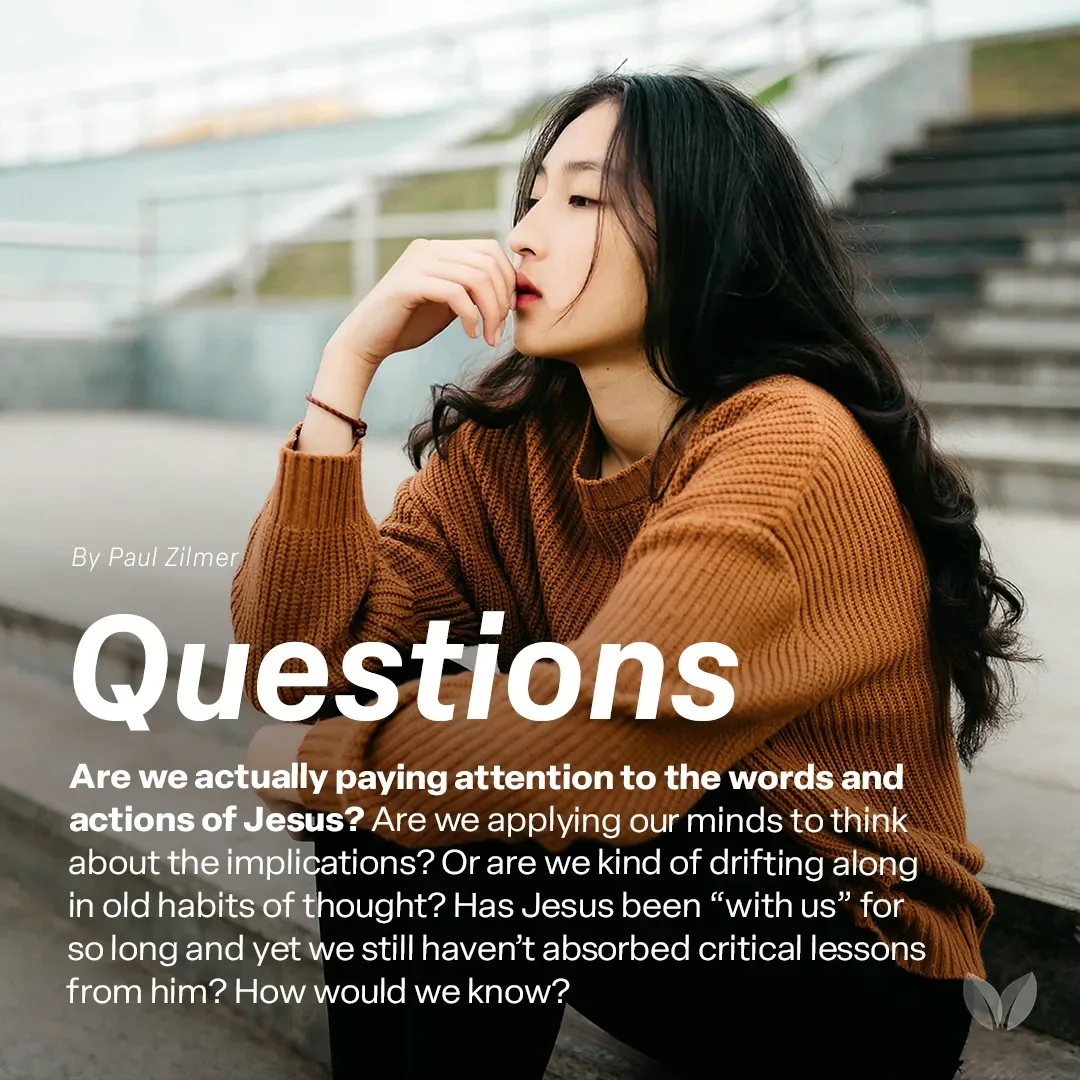Questions
Jesus asked questions. As we know, this is an effective teaching technique. Several of his questions were directed to people who were trying to challenge him, and his questions fired the challenge right back at them. We may not feel like we’re doubting or challenging him, but I think we can benefit from taking his questions to heart. Part of the effectiveness of teaching by asking questions happens when we explore the “question behind the question”, as it’s sometimes called. Let’s look at a few.
“Have you never read in the Scriptures: ‘The stone that the builders rejected has become the cornerstone; this was the Lord's doing, and it is marvelous in our eyes’ “? (Matthew 21:42) What is the point of this? What’s the question behind this question? Seems to me to be two-fold. First, are we faithfully reading and paying attention to the scripture? If we aren’t, how can we possibly hope to know what the Father and His Son are doing? And second, are we reading the Old Testament scriptures as being all about the work of Messiah?
“And as for the resurrection of the dead, have you not read what was said to you by God: ‘I am the God of Abraham, and the God of Isaac, and the God of Jacob’? He is not God of the dead, but of the living.” (Matthew 22:31-32) The Sadducees challenged Jesus on the doctrine of resurrection, and this is how he responded. There’s some, but not a great deal, of overt Old Testament teaching that the hope of God’s people is in the resurrection of the dead. However, there’s a lot there that’s less overt, for those who have their eyes open. (Another example is highlighted in Hebrews 11:17-19.) The question behind the question, for us: Are we seeing and appreciating that all fundamental Christian doctrines are firmly established from the very beginning, and can be found all through the Old Testament?
And immediately Jesus, perceiving in his spirit that they thus questioned within themselves, said to them, “Why do you question these things in your hearts? Which is easier, to say to the paralytic, ‘Your sins are forgiven,’ or to say, ‘Rise, take up your bed and walk’? But that you may know that the Son of Man has authority on earth to forgive sins”—he said to the paralytic— “I say to you, rise, pick up your bed, and go home.” And he rose and immediately picked up his bed and went out before them all, so that they were all amazed and glorified God, saying, “We never saw anything like this!” (Mark 2:8-12) Jesus had just told a paralytic that his sins were forgiven, and some considered this to be blasphemy. Jesus’s questions acknowledge that it’s easy to say something that’s not testable, such as forgiving sins. And then he demonstrates his actual authority by healing the man’s disability. What question directed at us might be behind his questions? Perhaps: Do we in effect doubt Jesus’s ability to forgive someone, by remaining unforgiving ourselves? Or perhaps: Are we seeing the hand of Jesus and the Father at work in one way, and therefore accept that they are at work in other ways we cannot see? Instead of feeling they’ve failed us, just because we can’t see it yet.
Here’s one that arises from a disciple’s question rather than an opponent’s challenge. Philip said to him, “Lord, show us the Father, and it is enough for us.” Jesus said to him, “Have I been with you so long, and you still do not know me, Philip? Whoever has seen me has seen the Father. How can you say, ‘Show us the Father’ “? (John 14:9) Jesus doesn’t shut down questions from his followers, but he does have expectations of us. Behind his question to Philip are some questions he might have for us. Are we actually paying attention to the words and actions of Jesus? Are we applying our minds to think about the implications? Or are we kind of drifting along in old habits of thought? Has Jesus been “with us” for so long and yet we still haven’t absorbed critical lessons from him? How would we know? Maybe by asking ourselves how long it’s been since we discovered (or had pointed out to us) something about Jesus and the Father and their work that we hadn’t thought of before. Maybe posing to ourselves these questions behind the Lord’s questions.
Love, Paul


